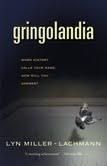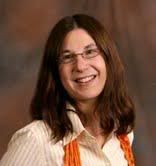 Though haunted by memories of his father's arrest in Pinochet's Chile,
Though haunted by memories of his father's arrest in Pinochet's Chile,Daniel Aguilar has made a new life for himself in the United
States--far from politics. But when his father is released, Daniel
sees what years of prison and torture have done. Trying to reach his
father, Daniel, along wth his "gringa" girlfriend, finds himself in
the democracy struggle of the country he thought he left behind.
1. Welcome to Yay! Reads, Lyn! Being a latina myself, I find it very
easy to relate to the story and the culture. How do you think people
of different ethnicities and backgrounds will relate to the story?
I’ve found that people from a wide variety of backgrounds can relate
to the story. Many white Anglo readers find themselves identifying
with Daniel’s girlfriend, Courtney, and follow her as she stumbles
into adventures and misadventures while trying to become part of
another culture. Others are simply fascinated to see another culture
and travel via the novel to a distant and remote part of the world
where there was a lot of conflict, unrest, and danger at that time.
I’ve also gotten a great response not only from Latina/o
readers—including boys who, it is rumored, don’t read—but also from
immigrant teenagers from all backgrounds. Some of my most enthusiastic
readers were recent immigrants from India, Pakistan, and Bangladesh
who I met when I was a writer-in-residence in their ESL program at a
high school in Connecticut. Several of the South Asian students wrote
me letters afterward asking me, among other things, if a sequel is
planned. (It is.)
2. Did you research for GRINGOLANDIA? How?
I had to do a lot of research to make Gringolandia accurate in both
the facts and the feelings and actions of the characters. The first
way I researched was to get to know exiles from Chile who lived in
Madison, Wisconsin, where I lived at the time. During the 1980s, I
worked with many political refugees from Central and South America,
teaching English, helping their children in school, and organizing
concerts of music from their countries. I spent a lot of time in their
homes and heard their stories of why they left. That’s when I started
to write my novel, back in 1987.
Then, in 1989, I received a work-in-progress grant from the Society of
Children’s Writers and Illustrators to travel to Chile. While there, I
stayed with the families of several musicians whose concerts I
organized. I also witnessed the transition from 17 years of
dictatorship to a democratically elected government. Here, we take our
democracy for granted, but when I was there, still during the
dictatorship, there were soldiers with machine guns everywhere and
people had to be very careful about what they said. Things could get
very scary very fast, as I found out when soldiers pulled over the
cars in which I was riding—four times in a three-week trip.
While I did most of my research then, the book wasn’t published until
last year because I had trouble finding a publisher and gave up on the
novel for a long time. When I came back to it, it was no longer a
contemporary novel but a historical novel, so I had to rewrite it
completely to make it work for readers who weren’t even born when the
events took place.
3. What are your must-haves when writing?
Coffee, Diet Dr. Pepper, and music. I might have to add a more
comfortable chair to the list, though.
4. How would you describe your style of writing?
I find it hard to write for only an hour or two each day. When I’m
working on a first draft, I’ll write for twelve or fourteen hours a
day just to get the story down, but then I’ll go for days or weeks at
a time without writing at all. That’s when I think about what I’m
going to write next. When I’m revising, though, I work more steadily,
a few hours at a time. I know there are writers who have a set
schedule and write during their “writing hours”—usually early in the
morning—whether or not they have anything to say. I can’t do that, and
I usually write better in the evening and late at night rather than in
the morning anyway.
5. What genres do you like most to write? The least?
I’ve written both adult and young adult fiction, and I definitely
prefer young adult because for a lot of the things that happen in the
novel, it’s the characters’ first time. In Gringolandia, for example,
Daniel realizes for the first time that his father may not be the hero
everyone’s led him to believe. That’s a huge thing, learning that the
world is a dangerous place, your parents are flawed, they can’t
protect you, and you might even have to protect them.
My least favorite genre to write? Probably science fiction. I failed
eighth grade science and struggled through the slow classes throughout
high school. Physics? Calculus? Never got anywhere near them.
In the end, a think a writer has to write in the genres she likes to
read. I don’t really enjoy reading science fiction. I love historical
and contemporary realistic fiction.
6. Finally, who are your favorite authors?
A lot of the authors I like have written both for adults and for
teens, among them Edwidge Danticat, Julia Alvarez, Isabel Allende, and
Benjamin Alire Saenz. I love Nicholasa Mohr’s stories of growing up in
the Puerto Rican neighborhoods of East Harlem and the South Bronx and
was fortunate to be able to work with her on editing a collection of
short stories by Latino authors titled Once Upon a Cuento (Curbstone
Press, 2003).
-----------------------------
 Lyn Miller-Lachmann is the Editor-in-Chief of MultiCultural Review,
Lyn Miller-Lachmann is the Editor-in-Chief of MultiCultural Review,the author of the award-winning reference book Our Family, Our
Friends, Our World: An Annotated Guide to Significant Multicultural
Books for Children and Teenagers (1992), the editor of Once Upon a
Cuento (2003), a collection of short stories for young readers by
Latino authors, and the author of the novel Dirt Cheap (2006), an
eco-thriller for adult readers. For Gringolandia, she received a
Work-in-Progress Grant from the Society of Childrens Book Writers and
Illustrators.
Other tour stops:
Feb 1st: Laina Has Too Much Spare Time
Feb 2nd: Read Into This!
Feb 3rd: Pirate Penguin's Reads
Feb 4th: The Bookologist
Feb 5th: Yay! Reads
Thanks Lyn! Now you have a chance to win a signed copy of GRINGOLANDIA. Just fill in the form below:





3 comments:
Thanks for inviting my to your blog, Patty. Great questions, too. I'm glad you liked the story, found it real, and thought Courtney was an interesting character. In answer to your father's observation, she's what would be called the "impact character" because her actions lead the other characters to change.
Thanks for the great interview, Patty! I'm horrid at math and science as well.
I hated playing into the stereotype with that one, but there are some excellent women writers of science fiction, most recently Suzanne Collins with The Hunger Games and Catching Fire. And the novel I'm starting now features a girl who is interested in science, technology, and environmental issues. Not science fiction, though.
Post a Comment